
Since its return to democracy in 1990, Chile has been an active participant in the regional and international arena. Chile assumed a two-year non-permanent position on the UN Security Council in January 2003 and was re-elected to the council in October 2013. It is also an active member of the UN family of agencies, serving as a member of the Commission on Human Rights and participating in UN peacekeeping activities. Chile hosted the second Summit of the Americas in 1998, was the chair of the Rio Group in 2001, hosted the Defense Ministerial of the Americas in 2002, and the APEC summit and related meetings in 2004. In 2005 it hosted the Community of Democracies ministerial conference. It is an associate member of Mercosur and a full member of APEC. The OECD agreed to invite Chile to be among four countries to open discussions in becoming an official member.

The government's official policy is one of nonalignment. In its search for assistance to meet the goal of national reconstruction, the government of Equatorial Guinea has established diplomatic relations with numerous European and Third World countries. Having achieved independence under UN sponsorship, Equatorial Guinea feels a special kinship with that organization. It became the 126th UN member on November 12, 1968. Equatorial Guinea served as a non-permanent member on the United Nations Security Council from 2017 to 2019.

The foreign relations of Jordan have been consistently a pro-Western foreign policy.

Israel–New Zealand relations are the foreign relations between the State of Israel and New Zealand. While Israel has an embassy in Wellington, New Zealand's embassy in Ankara, Turkey is accredited to Israel. Diplomatic relations between the two countries date back to January 1949. New Zealand has exported a mixture of agricultural and manufactured goods to Israel. In return, Israel has exported a range of manufactured goods to New Zealand. Bilateral relations between the two countries have been complicated by issues such as the 2004 Israel–New Zealand passport scandal, United Nations Security Council Resolution 2334, and the Israel-Palestine conflict.

Moldovan-Spanish relations are foreign relations between Spain and Moldova. On 30 January 1992 Spain established diplomatic relations with Moldova. As of 2009 Spain does not have an embassy in Chişinău. Spain is represented in Moldova via its embassy in Bucharest in Romania.
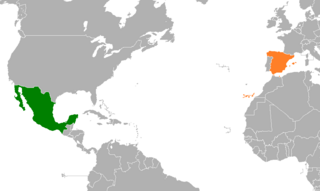
Ties between Mexico and Spain date back to the Spanish conquest of Mexico in 1519 and subsequent Spanish colonialism in the country which lasted until the end of the Mexican War of Independence in 1821. Formal diplomatic relations between both nations commenced in 1836 and were severed with the aftermath of the Spanish Civil War in 1939. Diplomatic relations were re-established in 1977 and have continued unabated since.
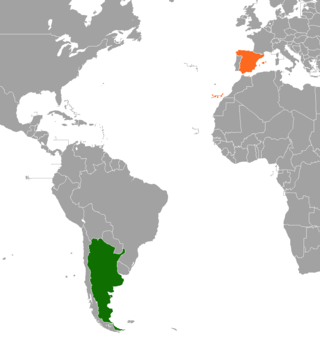
Argentina–Spain relations are the bilateral relations between the Argentine Republic and the Kingdom of Spain. Since a great portion of the immigrants to Argentina before the mid-19th century were of Spanish descent, the large majority of Argentines are at least partly of Spanish ancestry. Also, a significant part of the late-19th century/early-20th century immigrants to Argentina were Spaniards. Both nations are members of the Organization of Ibero-American States and the United Nations.

Finland–Spain relations are the diplomatic relations between the Republic of Finland and the Kingdom of Spain. Both nations are members of the Council of Europe, the European Union, the United Nations, the Schengen Area, the eurozone, and NATO. Spain strongly supported Finland's NATO membership during the latter's accession process. Diplomatic relations between the two countries have traditionally been good and fruitful and, at the same time, have consolidated an exchange at all levels. Spain is also one of the favorite destinations of Finnish tourism. Approximately ten percent of the Finnish population travels on vacation each year to Spain. Furthermore, the Finns are the fastest growing European community in Málaga, as Fuengirola is home to the second largest colony of Finns in the world, after Sweden.
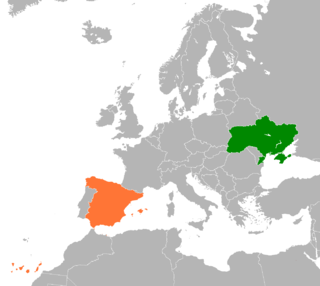
Relations between Spain and Ukraine were established in January 1992, some time after the Ukrainian independence. Spain is a member of the European Union, which Ukraine applied for in 2022. Both nations are members of the Council of Europe.
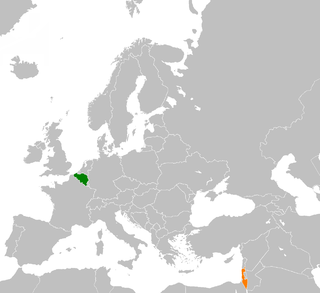
Belgium–Israel relations are the bilateral relations between Belgium and Israel. Belgium voted in favor of the United Nations Partition Plan for Palestine in 1947 and recognized the State of Israel on January 15, 1950. Belgium has an embassy in Tel Aviv, and Israel has an embassy in Brussels.

Eli Cohen is an Israeli politician. A member of the Knesset since 2015, he is currently the head of the Ministry of Energy. Cohen previously served as Minister of Foreign Affairs from 2022 to 2024. Cohen previously served as Minister of Intelligence (2020–2021) and Minister of the Economy and Industry (2017–2020).

Peru and Spain established diplomatic relations in 1879. Both nations are members of the Association of Academies of the Spanish Language, Organization of Ibero-American States, and the United Nations.
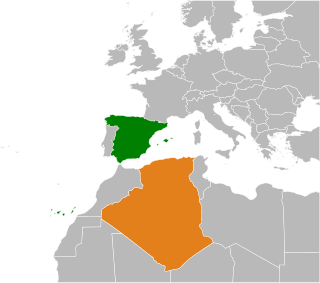
Algeria and Spain are full members of the Union for the Mediterranean.

Formal diplomatic relations between Angola and Spain were established in 1977. Angola has an embassy in Madrid. Spain has an embassy in Luanda.

Palestine–Spain relations are the bilateral and diplomatic relations between these two countries. Palestine has an embassy in Madrid. Spain has a consulate general in East Jerusalem that serves the West Bank, Gaza and Jerusalem. Spain currently does not recognise the state of Palestine, but has pledged to recognise Palestinian statehood by 28 May 2024.

Egypt–Spain relations are the bilateral and diplomatic relations between these two countries. Egypt has an embassy in Madrid. Spain has an embassy in Cairo. Both countries share a common framework in the context of the Union for the Mediterranean.

Libya–Spain relations are the bilateral and diplomatic relations between these two countries. Libya has an embassy in Madrid, and Spain has one in Tripoli.

Mozambique–Spain relations are the bilateral and diplomatic relations between these two countries. Mozambique has an embassy in Madrid. Spain has an embassy in Maputo.

José Manuel Albares Bueno is a Spanish diplomat who has been serving as Minister of Foreign Affairs, European Union and Cooperation in the government of Prime Minister Pedro Sánchez since 2021.

The Embassy of Peru in Madrid is the foremost diplomatic mission of Peru in Spain. The current ambassador is Walter Gutiérrez.



























